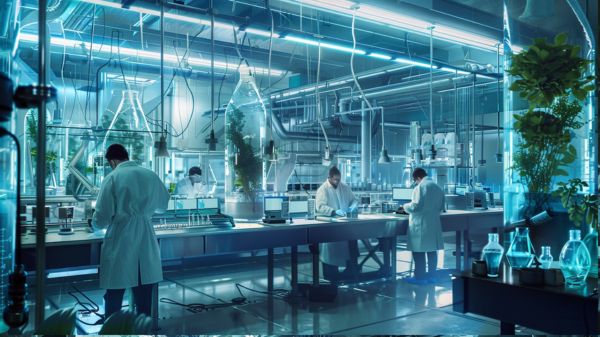Have you ever wondered how wood chips and agricultural residues could revolutionize the way we generate energy sustainably? The latest advancements in bioenergy technology are reshaping the landscape of renewable energy with advancements in biomass power plants, biofuel production, waste-to-energy technologies, and even sustainable jet fuel solutions.
These developments are not only reducing carbon emissions but also offering a promising path towards a greener future. Explore these latest cutting-edge advancements in bioenergy technology that are paving the way for a more sustainable energy sector.
Key Takeaways
- Ørsted Biomass Power Plant in Denmark: Utilizes wood chips for sustainable energy, reducing carbon emissions.
- Pacific Ethanol: Converts agricultural residues into biofuels for greenhouse gas reduction.
- Waste-to-Energy Plants: Convert organic material into electricity and heat for sustainable waste management.
- Biogas Plants: Use anaerobic digestion to convert organic waste into energy resources.
- Renewable Jet Fuel Innovation: Utilizes industrial waste gases for sustainable aviation fuel.
Ørsted Biomass Power Plant: Denmark’s Vision
The Ørsted Biomass Power Plant in Denmark exemplifies a groundbreaking vision for sustainable energy generation through the utilization of biomass materials like wood chips.
Denmark, known for its commitment to renewable energy, has made significant strides in the bioenergy sector with the establishment of this innovative facility. By harnessing biomass resources, the plant minimizes carbon emissions and plays a pivotal role in Denmark’s shift towards sustainable energy sources.
Ørsted’s approach to energy generation not only sets a remarkable example within Denmark but also serves as a model for global sustainable energy projects. The plant’s integration of cutting-edge technologies showcases how bioenergy can revolutionize power production while addressing environmental concerns. This vision for a greener future isn’t only admirable but also essential for combating climate change and promoting a more sustainable world.
The Ørsted Biomass Power Plant stands as a demonstration of the power of bioenergy in driving sustainability efforts and shaping the future of energy generation.
Pacific Ethanol: Leading Biofuels Production
With a focus on converting agricultural residues into biofuels, Pacific Ethanol leads the way in low-carbon renewable fuel production. Specializing in the transformation of materials like corn stover, Pacific Ethanol is a key player in the bioenergy industry.
Their biomass-to-ethanol process stands out for effectively reducing greenhouse gas emissions, contributing to the National Renewable Energy goals. Pacific Ethanol’s innovative approach not only produces renewable fuels but also plays an essential role in reducing the environmental impact of traditional fossil fuels.
Waste-to-Energy Plants: Efficient Waste Utilization
Maximizing the efficient utilization of organic materials, waste-to-energy plants employ advanced technologies to convert waste into valuable sources of electricity and heat. These facilities play an essential role in sustainable waste management by processing municipal solid waste and agricultural residue.
Countries like Sweden have embraced waste-to-energy plants, reducing landfill usage and curbing greenhouse gas emissions significantly. By revolutionizing waste disposal practices, these plants not only generate renewable energy but also minimize environmental impact.
Waste-to-energy facilities offer a sustainable solution for effective waste management while contributing to the production of clean, renewable energy sources. With cutting-edge technologies and innovative approaches, waste-to-energy plants represent a critical step towards a more sustainable and environmentally conscious future.
Embracing these advancements in waste-to-energy technology can lead to a more efficient utilization of resources and a reduced dependence on fossil fuels for energy generation.
Biogas Plants: Organic Waste Conversion
Biogas plants are at the forefront of waste-to-energy technology, utilizing anaerobic digestion to convert organic waste into valuable energy resources.
By processing organic matter, these plants contribute to circular economy solutions, reducing waste and promoting sustainability.
The biogas produced can be harnessed for heat and electricity generation, making it an essential player in the shift towards renewable energy sources.
Waste-to-Energy Technology
Utilizing anaerobic digestion, organic waste is efficiently converted into usable energy in biogas plants, showcasing a vital approach to waste management and renewable energy production.
Biogas plants, such as the one in Stockholm, Sweden, exemplify the innovative use of organic matter to generate heat and electricity while contributing to a circular economy. By processing materials like food scraps and agricultural byproducts, biogas technology not only minimizes waste but also provides a valuable source of energy, addressing waste disposal challenges in an environmentally friendly manner.
These plants play an essential role in sustainable energy production, demonstrating the potential of biogas as a renewable energy source. Through the transformation of organic waste into biogas, these facilities offer a practical solution that aligns with the growing demand for renewable energy options and sustainable waste management practices.
Biogas plants stand at the forefront of waste-to-energy technology, showcasing how organic matter can be harnessed to create valuable energy resources.
Circular Economy Solutions
One key strategy in promoting a circular economy involves converting organic waste into usable energy through biogas plants. These innovative facilities, exemplified by the biogas plant in Stockholm, Sweden, harness the power of anaerobic digestion to transform organic matter like food scraps and agricultural byproducts into renewable energy sources.
By generating biogas from organic waste, these plants not only provide heat and electricity but also contribute greatly to minimizing waste and advancing the principles of the circular economy. Projects centered around biogas plants are pivotal in addressing environmental concerns while simultaneously producing sustainable energy solutions.
The success of these initiatives underscores the potential of organic waste conversion in fostering renewable energy production and creating a more efficient and environmentally conscious system. Embracing the concept of circular economy through the utilization of biogas plants marks an important step towards a more sustainable and resource-efficient future.
Renewable Jet Fuel Innovation: Sustainable Aviation
In the domain of sustainable aviation, a groundbreaking development has emerged with Virgin Atlantic’s adoption of renewable jet fuel derived from carbon-rich industrial waste gases produced by LanzaTech. This innovative approach, backed by funding from BETO, aims to reduce greenhouse gas emissions in the transportation sector, addressing sustainability challenges within air travel.
By utilizing carbon-rich waste gases, this technology not only provides a sustainable source of renewable jet fuel but also showcases the potential for bio-based solutions in the aviation industry. The integration of renewable jet fuel from LanzaTech signifies a significant step towards environmental goals, demonstrating the feasibility of utilizing green alternatives to traditional aviation fuels.
This advancement highlights the importance of seeking sustainable practices within the aviation sector, offering a promising solution to mitigate the industry’s impact on the environment.
Algal Turf Scrubbers: Environmental Algae Solutions
Algal Turf Scrubbers, developed by Sandia National Laboratories, efficiently absorb excess phosphorus and nitrogen from runoff sites to mitigate harm to aquatic ecosystems. These systems harness the power of algae to cleanse water, presenting a dual-purpose solution.
Not only do Algal Turf Scrubbers help improve water quality by removing pollutants, but they also hold the potential to convert algae into biofuel, offering additional environmental benefits.
The primary objective of Algal Turf Scrubbers is to enhance water quality while promoting sustainable practices for ecosystem preservation. By utilizing algae in this innovative manner, these scrubbers combat nutrient pollution and explore the domain of biofuel production.
This technology showcases a promising approach to leveraging algae’s natural abilities to clean water bodies effectively.
Biofuel Production From Sludge Waste
Harnessing innovative technology developed by Pacific Northwest National Laboratory, biofuel production from sludge waste revolutionizes the management of wet wastes at water treatment plants.
This cutting-edge process efficiently converts sewage sludge into biofuel, offering a sustainable solution for waste management and renewable energy generation.
By transforming water treatment plants into water resource recovery facilities, this method not only addresses the costly disposal of sewage sludge but also provides an economically viable alternative.
| Benefit | Description |
|---|---|
| Efficient Waste Management | Technology efficiently converts sewage sludge into biofuel. |
| Cost-Effective Solution | Provides an economically viable alternative for waste disposal. |
| Sustainable Energy | Contributes to renewable energy generation. |
This innovative approach reduces environmental impact significantly, offering a dual benefit of waste management and renewable energy production. Biofuel production from sludge waste showcases a step towards a more sustainable future, aligning with the increasing global focus on renewable energy sources.
Terragia’s Low-Carbon Biofuel Technology
You’re about to explore Terragia’s cutting-edge low-carbon biofuel technology, paving the way for carbon-neutral fuel solutions in the bioenergy sector.
By prioritizing sustainable biofuel development, Terragia’s innovative approach reduces carbon emissions, aligning with the global push for environmentally friendly energy solutions.
The company’s commitment to low-emission technologies signifies a significant step towards a greener and more sustainable future in energy production.
Carbon-Neutral Fuel Solutions
Terragia’s low-carbon biofuel technology revolutionizes the transportation sector by offering carbon-neutral fuel solutions. This innovative approach aims to notably reduce carbon emissions, contributing to a more sustainable environment.
Terragia’s commitment to environmental responsibility is evident in securing $6 million for the development of this cutting-edge biofuel technology. By providing low-carbon fuel alternatives, Terragia’s biofuel technology showcases a clear path towards achieving carbon neutrality in the transportation industry.
| Benefits of Terragia’s Biofuel Technology | |
|---|---|
| Reduces carbon emissions | Enhances sustainability |
| Offers carbon-neutral fuel solutions | Secured $6 million for development |
| Showcases potential for carbon neutrality |
Terragia’s biofuel technology stands out as a beacon of hope in the quest for greener energy solutions. Embracing this technology not only minimizes environmental impact but also paves the way for a cleaner and more sustainable future.
Sustainable Biofuel Development
The sustainable development of low-carbon biofuels by Terragia’s innovative technology has garnered $6 million in funding, emphasizing advancements in feedstock sustainability and cost-effective production methods.
Terragia’s biofuel innovation focuses on enhancing feedstock sustainability through plant-microbe interactions, aiming to produce inexpensive and carbon-neutral biofuels. By prioritizing efficient water and nutrient utilization in biofuel production, Terragia’s efforts highlight the significance of bio-based technologies in both the bioeconomy and climate change mitigation.
This approach not only contributes to the development of sustainable biofuel solutions but also underscores the importance of reducing carbon emissions in the bioenergy sector. Terragia’s commitment to sustainable biofuel development showcases a step towards a greener future, where carbon-neutral biofuels play a critical role in meeting energy demands while mitigating environmental impact.
Embracing such latest advancements in bioenergy technology fosters a more sustainable and eco-conscious approach to fuel production.
Innovative Low-Emission Technologies
Advancing beyond sustainable biofuel development, the focus now shifts to Terragia’s innovative low-carbon biofuel technology designed to greatly reduce emissions in the transportation sector. This groundbreaking technology has secured $6 million in funding for development and aims to produce biofuels with markedly lower carbon emissions.
Terragia’s approach not only enhances the sustainability of biofuel production but also contributes to reducing greenhouse gas emissions in the transportation sector, marking a noteworthy stride towards a more environmentally friendly energy future.
Terragia’s low-carbon biofuel technology secures $6 million in funding.
Aims to produce biofuels with markedly lower carbon emissions.
Enhances sustainability and reduces greenhouse gas emissions in the transportation sector.
Terragia’s innovative low-carbon biofuel technology, supported by the Bioenergy Technologies Office (BETO), is a critical advancement in the quest for environmentally friendly fuel solutions.
Private-Public Funding for Bio-Based Innovations
Among the latest advancements in bioenergy technology sector is the innovative private-public funding model driving bio-based technology commercialization. This funding model combines $750,000 from the DOE’s Technology Commercialization Fund with private investments to accelerate the advancement of bio-based innovations.
Operating on a 50-50 cost-sharing basis, this approach fosters collaborations between NREL, industry partners, and entrepreneurs, essential for the successful commercialization of bioenergy technologies. The primary focus of this funding model is to facilitate the achievement of commercial impact and widespread adoption of energy technologies.
NREL’s receipt of 16 Technology Commercialization Fund grants this year underscores the commitment to driving forward bio-based technologies and innovations. By leveraging this collaborative funding model, bioenergy innovators can access the resources and support necessary to propel their technologies from the lab to the market, ultimately contributing to the advancement and proliferation of sustainable bio-based solutions.
Conclusion
To sum up, the latest advancements in bioenergy technology are revolutionizing the way we generate sustainable energy and reduce carbon emissions. As the saying goes, ‘Innovation is the key to a brighter future.’
Companies like Ørsted and Pacific Ethanol are leading the charge in utilizing biomass resources for power generation and biofuel production. Waste-to-Energy and Biogas Plants are also making significant strides in converting organic waste into electricity and heat.
With advancements in renewable jet fuel technologies and algae solutions, the future of bioenergy looks promising.




